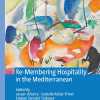Dr Norbert Bugeja has just published a new poetry collection in Maltese, titled Nartiċi (Midsea Books, 2016). The collection emerges from a gradual and careful process of creative annotations—and a regular creative diary—that the author kept over the past seven years as he travelled across the Mediterranean region, very often on research trips, scholarly conferences and literary events. Bugeja’s poems derive their tensions from intimate experiences and underlying stories that characterise life in the region, and particularly its maritime and coastal towns and cities.
The title itself, Nartiċi, refers to the narthex, the vestibule or ante-chamber to early Byzantine churches that was annexed to the sacred building as a space that housed penitents during religious services, as well as philosophy classes. The space of the narthex often featured ancient Greek scholars and philosophers depicted in mosaics and frescoes that could not be represented within the church itself.
Commenting on Bugeja’s new collection, poet and literary scholar Maria Grech Ganado writes that ‘What I find most seductive about Norbert Bugeja’s Nartiċi is its fluidity. His multi-layered poetry travels through diverse global locations carried by rich images which intermingle description, experience and reflection. Alternative verbal connotations and images sometimes flow through diverse poems with the poetical harmony of a symphony.
Wings, for instance, can be used alternatively as aspects of birds, architecture, human bodies, or the texture of marble can apply to stone, flesh or attitude. Spaces may assume human form. Personification brings cities, memories, musings, myth, history and nature to life, while actual characters root the concrete in reality or, as with children, enhance atmosphere. The undefined space of the title’s image—the narthex—captures the confluence which characterises this superb collection.’
Dr Bugeja is Research Fellow in Postcolonial Studies at the Mediterranean Institute.



